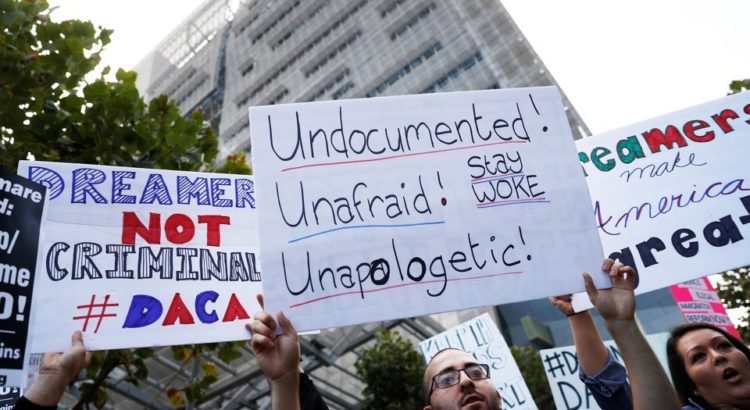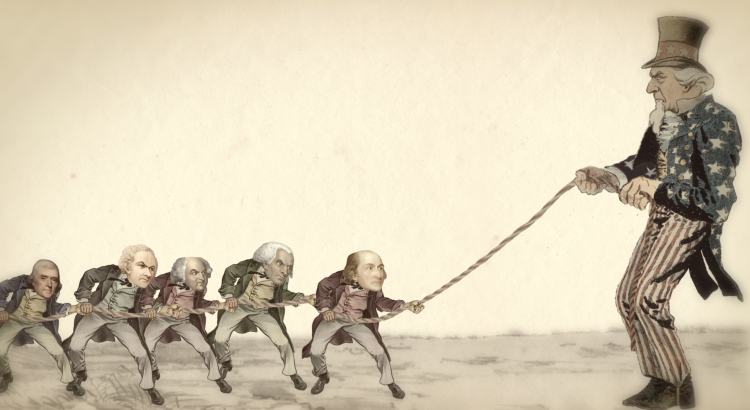A number of states are forbidding the federal government from settling within their jurisdictions some of the thousands of Syrian refugees President Obama wants to admit into the US. The President has declared that he will force the states to accept however many of these refugees as he sees fit, and so the stage is set for a major constitutional showdown, like two gunslingers in an old western movie squaring off against one another.
The outcome of this confrontation is far more critical to the future of what’s left of our republic than the welfare of these refugees. It goes to the very heart of the structure of our federally constituted republic and whether or not we shall finally fall into the pit feared by the Anti-Federalists at the time of the ratification of the Constitution by becoming a singular nationalized country instead of a union of independent, sovereign states.
To begin with, nowhere in the Constitution is the federal government granted the authority over the matter of granting refugees admittance. You can read it forwards and backwards, but that enumerated power is not stipulated. This being the case, then this authority must be a power retained by the citizens of the several states, who in their capacity as a body politic, according to the tenth amendment, have every right to make the determination as to the settlement of refugees within their borders.
How is it then that we have reached this juncture of a constitutional crisis over who has authority over immigration policy? Article I, Section 8, Clause 4 of the US Constitution stipulates that “Congress shall have the power…to establish an uniform Rule of Naturalization,…” At the time of the writing of the Constitution, there was a distinct difference in meaning between the terms “naturalization” and “immigration”, and they were not synonymous. For the first one hundred years of our history the federal government was only concerned with legislation which laid down the requirements aliens would have to satisfy to become citizens of the United States, while the states enacted their own laws regarding who would be permitted to enter their borders. It was not until the late 1800s that Congress began to enact immigration legislation. Over the past 130 or so years the courts have gradually upheld the federal government’s assumption of this power, but with varying degrees of suspect constructions (which makes this assumption on the part of the federal government even more dubious). The conventional argument is that the naturalization clause of the Constitution includes the authority over immigration as well, but such was not the meaning understood by the original authors of the Constitution. Note the absurd contortion Justice Kennedy resorted to in upholding this argument in the 2012 case of Arizona v. United States:
“The Government of the United States has broad, undoubted power over the subject of immigration and the status of aliens. … This authority rests, in part, on the National Government’s constitutional power to ‘establish an uniform Rule of Naturalization,’ U. S. Const., Art. I, §8, cl. 4, and its inherent power as sovereign to control and conduct relations with foreign nations….”
In order to substantiate that naturalization includes authority over immigration, he has to fall back on the authority of the federal government to deal with foreign nations. Really? Such so-called reasoning flies in the face of etymology and our early history (which would be the best indicator of which “sphere of influence” this matter resided).
In light of this and President Obama’s threat, we need to step back and consider the structure of the relationship between the federal government and the states as it was originally intended. In his throwing down of the gauntlet over this issue, the President is claiming that the federal government can set aside the wishes of the citizens of a state in regards to matters that are constitutionally retained by them.
The question becomes, ”Does this assertation comport to the form of the union created by the Constitution?” Our system vests sovereignty in but one place – the people of the several, yet united, states. The sovereign people of the states agreed to grant authority (or limited sovereignty if you will) to two spheres – the federal and state governments – via constitutions. It is in the US Constitution we see the spheres of authority between these two entities clearly delineated, and that neither “sphere” is permitted to invade that of the other.
In Construction Construed, and Constitutions Vindicated, published in 1820, John Taylor of Caroline, after quoting both Madison’s and Hamilton’s comments to this point in The Federalist Papers, succinctly summed up this principle with these words:
“The co-ordinacy of institution, the independence of each other, and the mutuality of the right of construing the federal constitution, are thus recognised and asserted, as existing in the federal and state governments; and the principle, which pervades the whole, must also pervade the parts. If the entire federal government possesses no supremacy over, and can require no subordination from the entire state governments, whilst acting within their respective spheres, no part or department of that government can exert a supremacy over, or exact a subordination from, the corresponding parts or departments of the state governments.”
To apply this to our current showdown between the states and President Obama, if the matter of admitting refugees is a matter left to the discretion of the states, and “If the entire federal government possesses no supremacy over, and can require no subordination from the entire state governments,” then for Obama to claim he can force the states to do otherwise is to turn Taylor’s principle on its head, namely, that if one part of the federal government can eviscerate the authority of the states in one matter, then the entire federal government can do likewise in all areas, and the significance of even the semblance of states’ existence is reduced to the theatre of the absurd.
It may well be that having the federal government control those permitted to immigrate into the United States, especially in this day and time, is the best course of action; but as Chief Justice John Marshall stated in McCulloch v. Maryland in 1819, “The peculiar circumstances of the moment may render a measure more or less wise, but cannot render it more or less constitutional.”
-December 4, 2015
Read More









